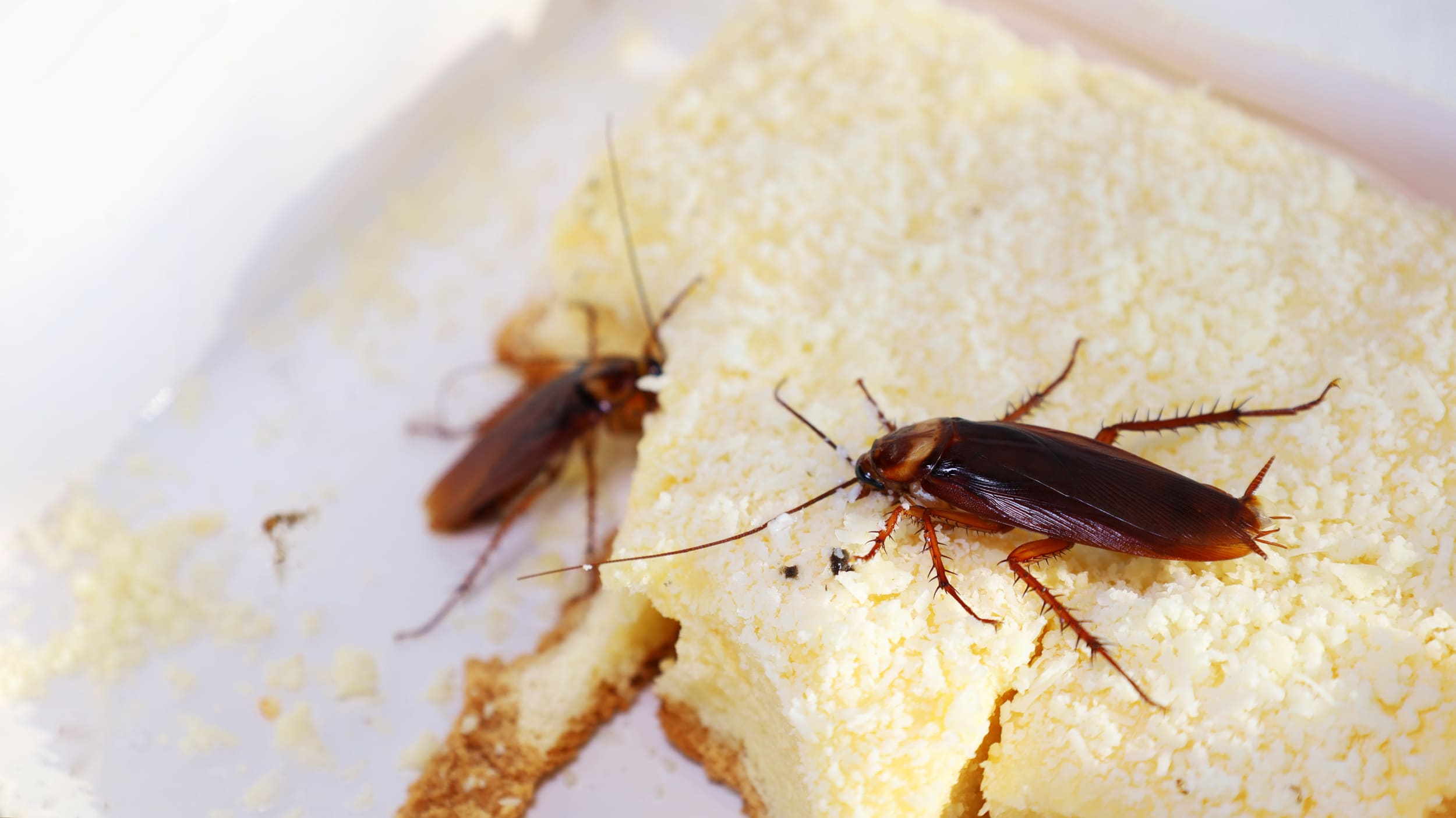
Cockroaches are some of the most resilient pests on the planet, capable of surviving in a variety of environments. Their ability to adapt and thrive in almost any setting makes them a formidable foe for homeowners and businesses alike, and understanding why they’re entering your home can help you begin the elimination process. Roaches will enter your home in search of food, but what do cockroaches eat? Knowing their eating habits is key to keeping these unwelcome guests out of your home and safeguarding your space from infestations. From sugary treats to decaying matter, cockroaches consume almost anything. Let’s look into the details to understand what fuels these persistent pests and how you can protect your property from them.
What Do Cockroaches Eat?
Cockroaches are opportunistic feeders, meaning they’ll eat just about anything they can find. Their diet includes food scraps, grease, and even non-food items like paper and glue. When traditional food sources aren’t available, cockroaches can survive by consuming leather, hair, other cockroaches, or even exposed skin left vulnerable while you’re sleeping.
Do Roaches Like Sugar?
Absolutely. Cockroaches are drawn to sugary substances, making spilled drinks and sugary snacks prime targets for their feasting. This preference for sweets is why many pest control baits use sugar as an attractant.
However, some foods repel them. Interestingly, cockroaches do not like garlic, and its strong smell is believed to be a natural roach repellent. While it’s not a foolproof solution, it can help deter them temporarily.
How Long Can Cockroaches Live Without Food or Water?
One of the most fascinating aspects of cockroach survival is their ability to go without food and water for extended periods. Most roaches can survive up to a month without food, but their survival without water is much shorter—usually about a week. While their ability to withstand hunger is impressive, their scavenging behavior ensures they’re constantly on the hunt for sustenance. This makes even the smallest crumbs a potential invitation for these pests.
Roaches in Southern California
Cockroaches are a significant concern in Southern California due to the warm climate and abundance of food and water sources. The most common species in the area include the American cockroach, German cockroach, and Oriental cockroach. Each type has slightly different preferences and habits but shares the same opportunistic feeding behaviors.
The warm weather in Southern California allows cockroaches to thrive year-round, making it essential for residents to stay vigilant. These pests are often found in kitchens, bathrooms, and other areas with easy access to food and water. Gardens and outdoor spaces can also attract cockroaches, especially when plants or organic matter are decaying.
Preventive measures like regular cleaning to remove what cockroaches eat, sealing entry points to prevent re-entry, and eliminating water leaks are especially critical in this region. Professional pest control services tailored to Southern California’s unique challenges can ensure your home remains roach-free.
The Unusual Dietary Habits of Roaches
Beyond their typical diet, cockroaches have been known to consume odd items such as toenail clippings, dead skin, and even toothpaste. With strong jaws capable of chewing through plastic and fabric, their eating habits are as diverse as they are unsettling.
Another intriguing (and unsettling) fact about these invasive winged pests is that roaches are cannibals. When food is scarce, roaches won’t hesitate to eat other roaches, including their eggs and young. This behavior ensures their survival in even the harshest conditions.
So you’ve cleaned everything up but are still finding roaches. How can that be? As mentioned, a roach’s diet can include any decaying or organic material. Therefore, roaches do, in fact, eat poop (including their own). This habit makes roaches a major health hazard due to their ability to spread bacteria and pathogens. Roaches are also known to eat plants, feasting on decaying plant material, which is another reason they’re often found in gardens or areas with potted plants. This diet, while grim, provides the nutrients they need to thrive.
Preventing Roach Infestations
Understanding what roaches eat and how they survive is crucial for prevention. Here are some practical tips to keep these pests at bay:
- Maintain Cleanliness: Regularly clean areas where food is prepared or consumed. Vacuum crumbs, wipe down counters, and promptly wash dishes.
- Store Food Securely: Use airtight containers and avoid leaving pet food out overnight.
- Eliminate Water Sources: Repair leaks, seal cracks, and remove moisture from damp areas to reduce access to water.
- Seal Entry Points: Inspect your home for gaps or holes where roaches can enter and seal them with caulk or other materials.
- Declutter Your Space: Cockroaches thrive in cluttered environments. Reducing mess gives them fewer hiding places.
By keeping your home clean, storing food properly, and sealing off entry points, you can eliminate what roaches eat, reducing the likelihood of an infestation. If you’re already dealing with roaches, professional pest control services can provide a comprehensive solution.
Keep Your Property Cockroach Free with Preventive Pest Control
At Preventive Pest Control of Southern California, we offer comprehensive pest control services, including inspections, targeted treatments, and preventative measures. From spraying bugs like ants, termites, spiders, mosquitos, and wasps to eliminating rodents, we craft tailored solutions to keep your home or business pest-free.
For over 20 years, we’ve protected residents in Orange County and the Inland Empire from pest threats with services tailored to your schedule and needs. We not only address current infestations but also implement proactive plans, tailored to prevent future ones. Don’t wait until a few roaches turn into an infestation. Contact us today for a free consultation, and let our expert team restore your peace of mind.
